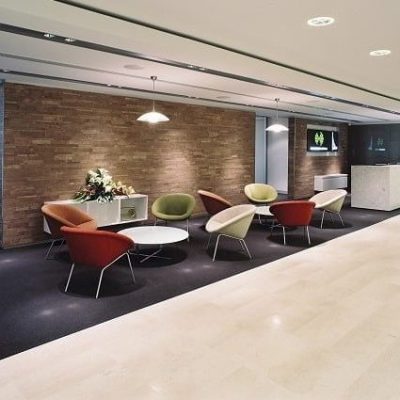10 Inspiring Tips for Choosing the Perfect Visitor Chair
- Updated:
About the author:
John Karle
Looking for a visitor or reception chair for your office? There are many options available in varying price categories, that are suitable for any visitor to your office, reception area, meeting room, office pod, or breakout area. Before you decide on the type of chair suitable for your visitors, be sure to consider these 10 important tips.
10 Inspiring Tips for Choosing the Perfect Visitor Chair
1. Who are your visitors?
Identifying your typical visitors is the essential first step before choosing visitor chairs or reception seating that creates an inviting atmosphere. For instance:
- Consider the company hierarchy: are your visitors more senior than you? If so, selecting upholstered visitor chairs for your office can create a respectful and comfortable environment.
- Are your visitors peers or team members? Choose a simple yet elegant upholstered or un-upholstered chair to foster connection and collaboration.
- In a factory or production setting, are your visitors dressed for the task? Opt for chairs that are not only easy to clean but also strong and long-lasting to support their needs.
- Are your visitors children? Think about fun and practicality—would a chair that spins and rolls inspire their creativity? Ensure height adjustability so they can comfortably engage.
- Are your visitors elderly and/or infirm? If so, higher chairs with armrests are a better option and it makes it easier for them to sit down and stand up again.
2. Where are your meetings held?
If you're meeting at your desk where your guests don’t require a workspace, consider chairs that are slightly lower than your desk to create an inclusive aura.
Meeting around a conference table opens up new possibilities, where you’ll want all chairs to be higher and, ideally, height adjustable to ensure comfort and encourage meaningful discussions.
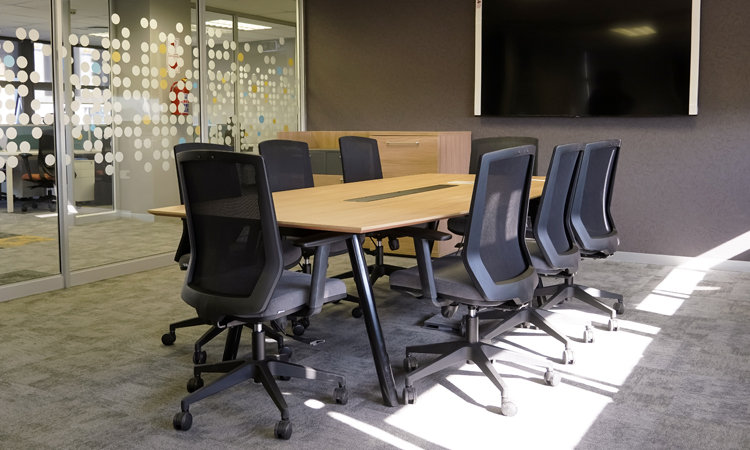
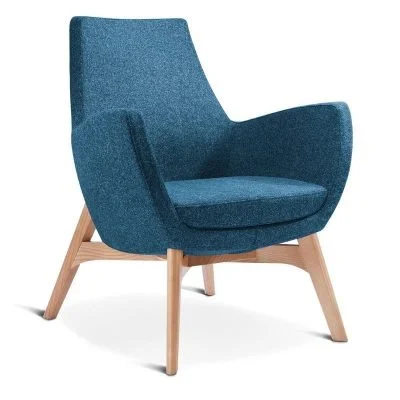
3. How long are your meetings?
If you want your meetings to be wrapped up quickly and efficiently, then you certainly shouldn’t opt for soft and luxurious visitor chairs that encourage prolonged sitting!
Instead, look for something plain, simple, and firm that communicates a clear message: “Let us get this meeting over in the shortest possible time while still being productive and effective”, rather than something that implies, “Welcome, relax and enjoy your stay!”
The right seating can significantly influence the tone and tempo of your meeting, ensuring that everyone remains focused on the goals at hand.
4. How much space do you have available?
If space is at a premium, it is essential to look for chairs that are not only physically smaller but also designed for greater functionality. For example, chairs with a swivel mechanism and castors can greatly enhance mobility, making it easier to maneuver in and out around the table, thereby improving the flow of movement during meetings.
5. What type of floor do you have?
- Tiles, Wood or Vinyl:
If you have a tiled, wooden, or vinyl floor, be mindful of noise. If you choose a chair with wheels, use soft PU castors to minimise noise and help the chair roll smoothly without ‘skidding’. Alternatively, consider a 4-legged or sleighbase chair with protective glides on the legs. - Carpet:
A thick carpet is not suitable for a wheeled chair as it limits movement. It is better to use a 4-legged or sleighbase chair.
- Tiles, Wood or Vinyl:
6. How large are your typical visitors and what style of chair should you provide?
Welcoming a visitor who feels uncomfortable sitting on the chair provided is not a good way to start a meeting!
Conversely, having large chairs for small people or children, can make them uncomfortable as they either have to sit on the edge of the seat so that their feet touch the floor, or if they sit back in the chair, they cannot bend their knees.
7. How high should your visitor chairs be?
The visitor chair will more than likely go together with a desk or table. If there is no table involved, then the height of the chair is not an issue. As a rule of thumb, the height of the chair seat should be between 25-30cm lower than the top of the desk. Task chairs are height adjustable, so set the height to accommodate your visitors.
8. What look & feel do you want to create?
Soft seating promotes more of a relaxed atmosphere and breaks the traditional boring office look. By adding a more designer or domestic feel, you can create a bit of exhilaration to your environment. Depending on the design of the chair and office, it will allow people to engage and chat more easily. This is especially the case in breakout areas where the purpose is to keep people in the office and allow interaction on a less formal basis. The use of soft seating in an office.
9. What type of upholstery do you prefer?
Fabric selection is vast and can sometimes be confusing. When choosing a fabric consider the following:
- Cleanliness:
Leather, leather look or vinyl upholstery is usually easier to clean than fabric. - Health & Safety:
In a medical environment, easy to clean vinyl or alternatively Anti-Microbial fabrics are a better option. - Design:
The choice of woven and printed fabrics is vast. Printed options can include anything from flowers, to cartoons, to family pictures. Prints are ideal in an environment where you would like your visitor to take notice of the fabric, for example a children’s waiting area. Depending on the quality of the fabric, a plastic covering can add longevity to the upholstery.
- Cleanliness:
10. What is your budget for visitor chairs?
Lastly, everything has a price tag, including an office visitor chair! Consider the above factors and match your requirements to what’s available. Cheap plastic chairs are available for under R100, whereas a more luxurious office visitor chair or leather couch can have a price tag of many thousands of Rands.
Types Of Visitor Chairs
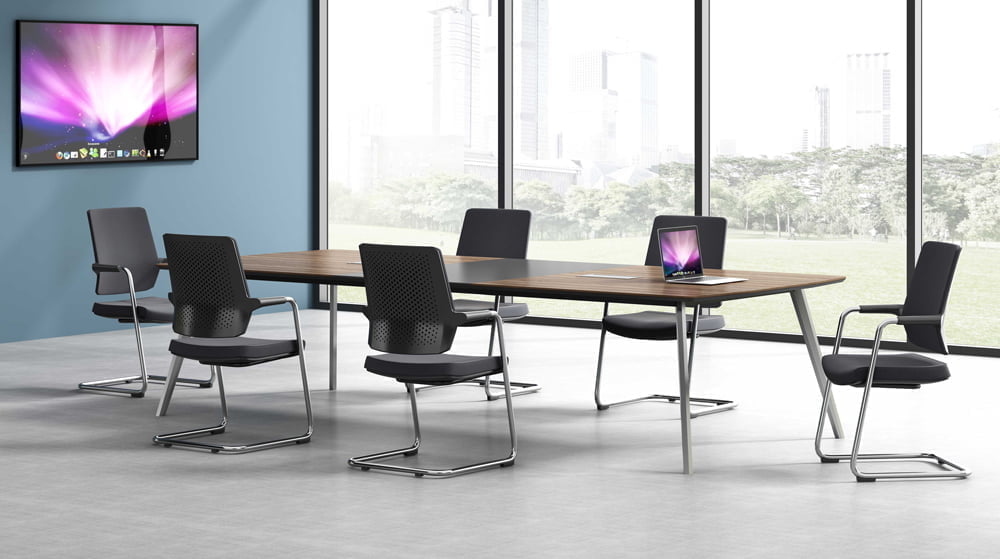
1. Traditional 4-Legged or Sleighbase Reception Armchair
Typically, this type of chair is sold as a set together with an Executive chair….all of them having the same look and feel.
Sleighbase or 4-legged visitor chairs can also be used in your reception area, or around a meeting or boardroom table.
2. An Operator or Task Chair for your Visitor
Task chairs are definitely a viable option when your visitors may have to use their laptop, take notes, or engage in various tasks that require their attention and focus.
The ability to adjust the chair correctly not only enhances your visitors' comfort but also allows them to stay fully engaged during the meeting. A well-designed, adjustable task chair promotes better posture and reduces fatigue, fostering an atmosphere conducive to productivity and collaboration.

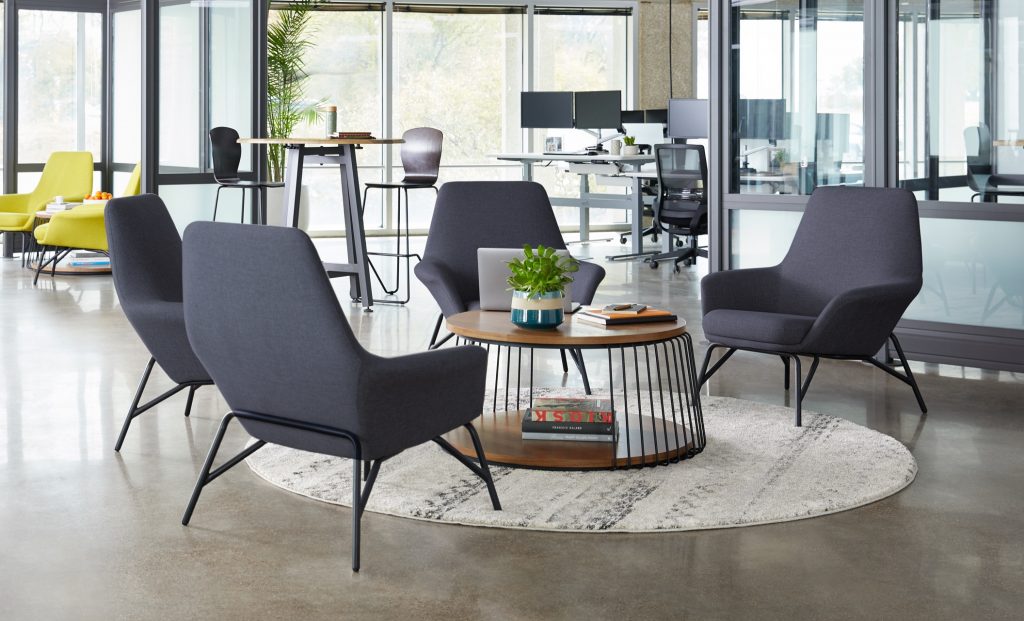
3. Soft seating in reception for visitors
This type of seating has really taken off in the last couple of years. By breaking the traditional unexciting office look, interior designers are mixing traditional office furniture with softer domestic seating.
This trend has added ‘life’ to the office environment and provides a huge selection of options in multiple shapes, sizes and configurations.
4. Canteen Chairs
When price is an important factor, consider plastic canteen-type chairs as a cost-effective solution for your visitors.
The styles available are virtually endless, offering a wide variety of designs to choose from. With or without upholstery, these chairs will suit most aesthetic preferences and budgetary constraints. In many cases, these chairs are stackable, allowing you to save space when they are not in use.


5. Reception Chairs
All the above chairs can also be used in your reception area….it is simply a function of the look and feel you want to present to your customers.
Social-distancing has resulted in a trend away from traditional bench seating. There are of course many alternatives depending on the space available.
Wrapping it up.....
Finding the right visitor or reception chair for your environment may seem complex, but the reward is enormous. The correct chairs bring a real sense of style and design into your office or workspace and will leave a lasting impression on your customers and visitors. Visit our showroom or Contact us for more information.
By the same author:

What is the difference between office chair mechanisms?
Office Chair mechanisms are regarded as the “heart” of an office chair.

What Is An Ergonomic Chair And How Do I Select My Ideal Seat?
There are many options available, but what is an ergonomic office chair? What features must it have? How do you make the right choice?

Office Furniture Suppliers for Ergonomic Solutions
Choosing the right office furniture suppliers in South Africa is crucial for creating a productive, comfortable, and stylish workspace.


